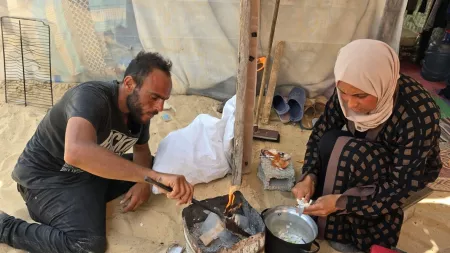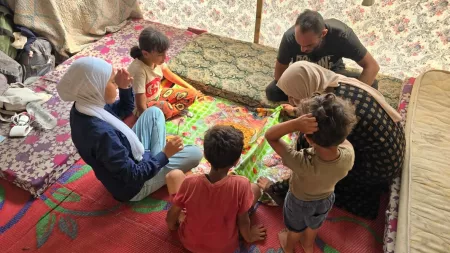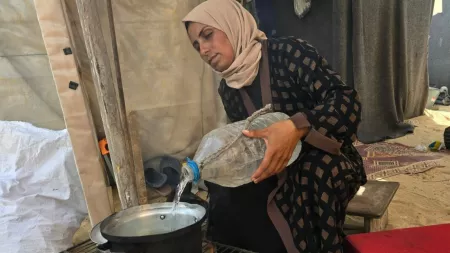Sara*, 36, has two daughters and two sons. She studied mechatronics and started her own business teaching children before the war started. She told CARE about how her life has changed since the attack on Rafah, and how her and her family struggle to find enough food and water.
When the war started, we suddenly lost everything we built over decades.
Life before and after the war
“Before the war started, our life was good. Both my husband and I worked jobs we liked, we lived in a nice house, and our four children liked going to school and playing with their friends in the afternoons. When the war started, we suddenly lost everything we built over decades, and also lost all our dreams of what could happen in the future. When we had to flee Rafah, it was the fourth time we have had to pack up and leave since the war started. These past months were hard, but fleeing Rafah and the hunger we face now are harder than anything we have endured before.
These past months were hard, but fleeing Rafah and the hunger we face now are harder than anything we have endured before.
Fleeing to survive
Bombs were falling when we were told to evacuate from Rafah. It took us six days to find a car to move us to Khan Younis. Six long days when we didn’t know if our children would survive this horror. We couldn’t afford the cars that were available. When we finally managed to arrange for someone to take us, he told us he would be there at 10 a.m. in the morning. He didn’t come until 7 p.m. Every minute we feared It would be too late for us to flee, and that we wouldn’t survive the waiting time. It was getting dark when he took us to Rafah. It took us around four hours as the roads were very busy and filled with cars and people.

Temporary shelters
In Rafah, we didn’t find a place to stay the first night we arrived. We moved into a tent with people we knew from Rafah. The women and children slept in the tent, the men outside. It is the first time we have had to live in a tent for such a period, and it is very hard. There is dust and sand everywhere, the smell of burning plastic and wood. I struggle with my breathing. I usually take medication to help me with my breathing issues, and I was fortunate that we have family outside the Gaza Strip who were able to send my medication across to Rafah. Now this is no longer possible, and my health is deteriorating every day. Since we arrived in Khan Younis, we haven’t received any support anymore – we know the borders are closed and no aid is coming through. At the same time, we have depleted our assets, and prices have gone up for everything we need.
Now, there is simply not enough food of any type, let alone fresh food.
Paucity of food
Before the war, we used to eat healthy food. My kids and I suffer from irritable bowel syndrome, so we always watched what we ate very carefully. Now, there is simply not enough food of any type, let alone fresh food. Every day, we can open one can of food and one bag of pasta. Beans, macaroni, canned food, sometimes hummus. Today, all we ate was a bag of macaroni. Yesterday we ate beans, and the day before rice. The other day, we wanted to buy some vegetables. Just buying a few onions and other vegetables for one meal costs at least 50 shekels (14 USD). Before the war, we would spend 50 shekels threw a big dinner party for lots of people to eat a big meal. Just one kilo of flour now costs 30 shekels (8 USD).
In order to get drinking water, my daughters and I walk for many hours every day.
In Rafah, we received canned food and some vegetables. We were able to take some of this food with us. The vegetables we have now are from Rafah, and that’s all the fresh food we have left. Sometimes, we are able to find sweets. I really don’t want to eat sweets; I want to eat healthy food. But it is sometimes more available and cheaper, and it provides us with more calories.
What will happen to my children? When will they be able to go back to school? What kind of future will they have? What about health care? Will we ever be able to get proper care again?
No clean water
The lack of water is another big problem. Most of what is available is very salty. There are no desalination plants anymore, and they bring the water from the sea. We only use it for cooking and washing clothes. We often only wash ourselves and the dishes twice per week as that’s all the water we have. Especially now in the summer, with the temperatures getting hotter and hotter, I wish we would be able to wash ourselves more often.
In order to get drinking water, my daughters and I walk for many hours every day. If we want to cook, we have to go the same distance twice, because we will need more water.

Deteriorating health
We have all lost a lot of weight since the war started. I have lost 10 kg in total. My children have stomach aches all the time, and it is hard for them to endure the hot temperatures without sufficient food. The children cannot focus. They have no place to play, and their lives mostly evolve around helping my husband and I get water and find food somewhere. They were used to having everything they need. Now even the simplest things have become hard. They wake up very early every morning, and they do not sleep well. They all miss going to school.
Prayers for a better future
My son, who was in second grade when the war started, now struggles with reading and writing. What will happen to my children? When will they be able to go back to school? What kind of future will they have? What about health care? Will we ever be able to get proper care again? All of this keeps me up at night, and I am so worried what will happen to us in the coming years.
I really wish that we will be able to receive assistance again soon. I wish we go back to our lives and work...there is fear everywhere around us and we do not feel safe.”
I am proud that our family sticks together, I am proud that my husband and children are helping me, and that we have somehow adapt to this new life filled with hunger, dust, and sand. I am also proud that when one of our children was sick that we managed to keep it spreading to the rest of the family despite the conditions - I make sure that we all frequently wash our hands.
I really wish that we will be able to receive assistance again soon. I wish we go back to our lives and work, but for now we have no other choice but to get help from others. I hope the borders open again soon and that aid reaches us again. More than anything I want this war to end. There is fear everywhere around us and we do not feel safe.”
*Name changed to protect the respective identity.
